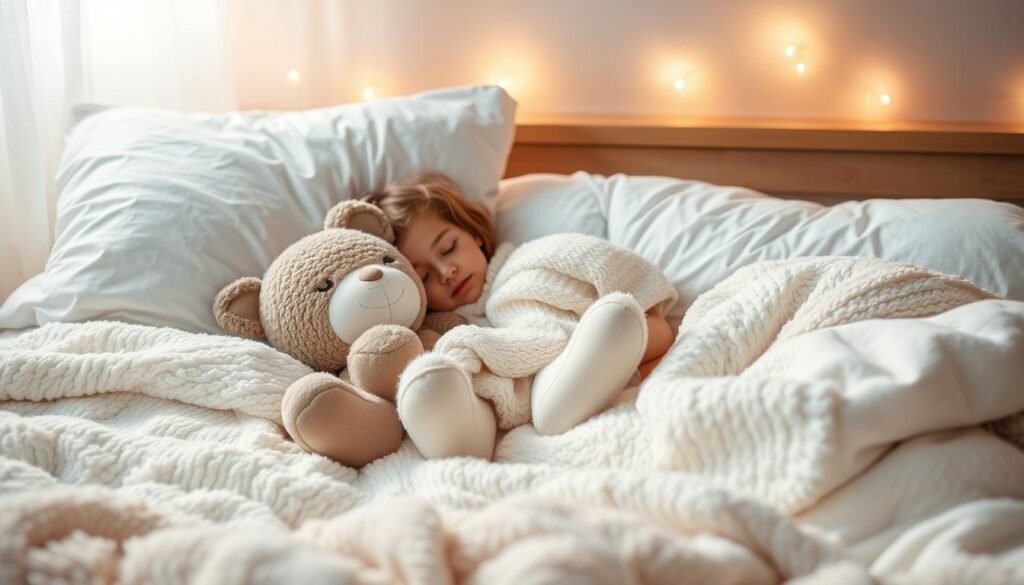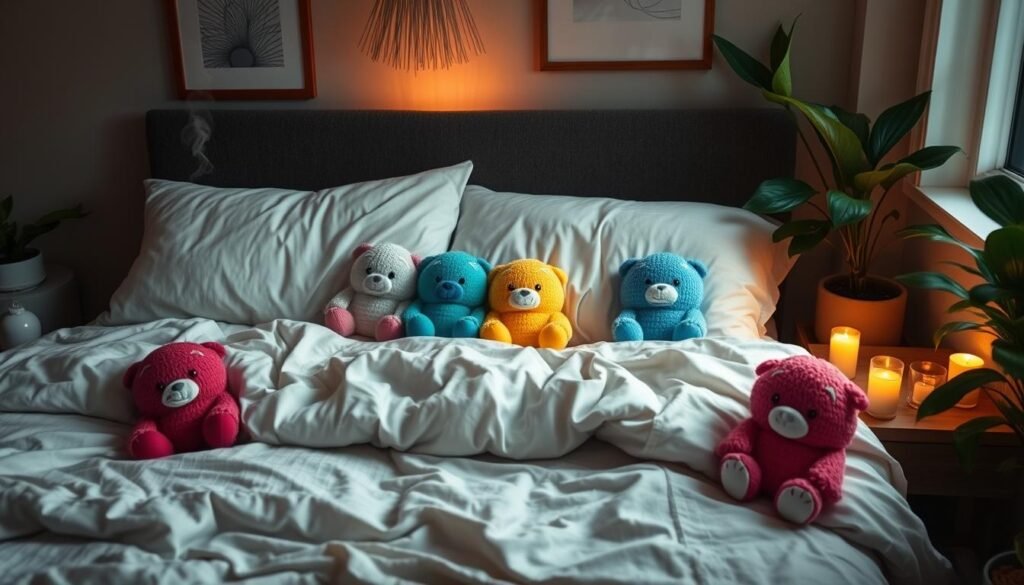Over 40% of adults still cuddle with stuffed animals at night. This trend highlights a growing awareness in mental health. Many people wonder if these stuffed friends can help lessen anxiety and make for better sleep. Anxiety plushes, especially those that are weighted, are being looked at for help with sleepless nights and restlessness. Although science hasn’t fully backed it up yet, many say hugging these plush toys can lead to feeling more relaxed and comfortable, which may help with sleep. In today’s fast-paced world, finding out how anxiety plushes could improve our sleep is more important than ever.
Key Takeaways
- More than half of American adults have kept their childhood teddy bears.
- About 20% of adults suffer from anxiety, which can interrupt sleep.
- Weighted stuffed animals might lower anxiety and aid in feeling calm.
- Studies show that soft toys can comfort kids and adults before sleep.
- The demand for weighted blankets has grown, hitting $220 million in 2020.
- Stories from people suggest weighted plushies offer support in tough times.
The Rise of Anxiety Plushes in Sleep Aids
In recent years, anxiety plushes as sleeping aids have become more popular. This shows a growing understanding of mental health issues. These weighted plush toys give a feeling of safety and stability at night. Studies suggest they can lower anxiety and improve sleep quality. This makes them a favored option for both adults and kids.
About one in three Canadian adults struggle with sleep. Over 36% of those not getting enough sleep report chronic stress. This shows that anxiety plushes can greatly improve sleep by managing stress and anxiety. These plush toys are loved by many, with 40% of Americans admitting they still sleep with stuffed animals. This underscores their emotional importance.
Companies have noticed how consumers are changing, leading to new sleep aids that offer both comfort and functionality. For example, Warmies makes heatable, weighted, scented stuffed animals to help reduce anxiety and promote calm. The market for these grown-up plush toys is huge, reaching about USD 11.76 billion. It’s expected to grow even more in the next few years.
The pandemic has made stress levels go up, so people are choosing self-soothing products. Items like weighted blankets and anxiety plushes give physical and emotional support. They play a big part in improving mental health. The growing proof of cuddling’s benefits supports using anxiety plushes in night routines.
The Science Behind Weighted Blankets and Sleep
Weighted blankets are known in sleep science for improving sleep. They use deep pressure stimulation to mimic the feeling of a tight hug. This lowers stress hormones and eases anxiety. People with sleep troubles like insomnia, ADHD, and autism spectrum disorder (ASD) find these blankets helpful.
About 40% of people struggled with sleep during the COVID-19 pandemic. Kids and teens were hit hard. While drugs and therapy are common for insomnia, they don’t work for everyone. Here, weighted blankets offer a new hope for better sleep.
These blankets have shown real benefits for people with sleep issues. They soothe children with ADHD and ASD, leading to improved sleep. A study by Sweden’s Karolinska Institute found that these blankets decrease anxiety and enhance sleep quality.
Further research confirms weighted blankets help many. They lessen negative feelings and daytime issues linked to insomnia and chronic pain. Offering a sense of security, they tackle insomnia, cut down stress, and aid relaxation.
To wrap up, here’s a table showing how weighted blankets aid sleep science:
| Benefit | Population | Outcome |
|---|---|---|
| Improved Sleep Quality | Adults and Children with ADHD/ASD | Significant enhancement in sleep patterns |
| Reduced Anxiety Symptoms | Adults experiencing anxiety | Drop in anxiety levels and better sleep |
| Relief from Insomnia | Patients with psychiatric disorders | Less daytime fatigue and better sleep |
| Positive Effects on Sleep Disorders | Elderly in nursing homes | Improved nighttime rest and reduced awakenings |
Can Anxiety Plushes Improve Sleep Quality?
Anxiety plushes, like weighted stuffed animals, offer emotional support and help improve sleep. They combine the pressure of weighted blankets with the comfort of toys. This mix creates a calming space for those with anxiety or trouble sleeping.
Weighted Stuffed Animals and Their Benefits
About one in three adults in Canada struggles with sleep issues. Similarly, 24–36% of people with insomnia have anxiety. Weighted stuffed animals help by feeling like a hug. This can lower stress hormones and increase relaxation and sleep quality.
Psychological Comforts of Using Plushes
Many adults find comfort in plush toys, with 40% sleeping with them. They’re not just nostalgic; they reduce brain activity and offer security. This helps ease anxiety and supports deep sleep. For more details, check out this study on weighted blankets.
How Cuddling Affects Sleep Patterns
Cuddling is important for everyone’s sleep patterns. It releases oxytocin, known as the “love hormone.” This helps us feel relaxed and trusted, which is good for sleep. A study showed that oxytocin lowers blood pressure and heart rate. This leads to deeper sleep and better control of our emotions.
Couples sleeping closer sleep better. Being close reduces stress and helps us fall asleep easier. Pets can also make us feel calm with their warmth and breathing.

Weighted stuffed animals can be comforting too. They make us feel safe and cozy. Having such items in bed can lower anxiety and improve our mood. It’s good for families to understand the benefits of cuddling. It can make everyone sleep better.
For more about weighted stuffed animals, click this link.
The Role of Transitional Objects in Sleep Quality
Transitional objects are key to improving sleep quality. They give people emotional support during hard times. Things like stuffed animals or weighted blankets are common examples. They help ease the mind, particularly for those with anxiety.
For many with autism, these objects are even more critical. Anxiety is common in the autism community. Thus, using comfort items is crucial for emotional grounding. Items like weighted blankets and vests are beneficial. They have proven to improve sleep for those on the autism spectrum.
However, getting these items can be tough due to money issues. Around 60 percent of autistic adults with college degrees are unemployed. This makes it hard for them to get comfort items. There’s also a stigma around using these items. It can make people feel self-conscious.
To combat this, educating caregivers and supporters is important. It helps foster acceptance in communities. Personalizing these items is also vital. Everyone has different likes. A personal fit can better manage anxiety and boost sleep quality. Studies show a strong link between comfort objects and fewer sleep problems. So, using these items daily can greatly improve emotional wellness and sleep.
Effects of Stress Relief on Insomnia
Understanding how stress relief and insomnia are connected is key for those facing sleep disorders. Stress plays a big role in sleep problems. Managing stress can help you sleep better.
Understanding Insomnia and Its Triggers
Many people have insomnia; in Canada, 1 in 3 adults find it hard to sleep. Stress is a big cause of this. More than 36% of Canadians who sleep poorly say stress is a problem in their lives.
Research shows 24-36% of people with insomnia also have anxiety. This shows how linked stress and sleep issues are.
Finding ways to reduce stress is vital to fight insomnia. Things like weighted stuffed animals can help. They soothe nerves with their weight and warmth. Toys like Warmies are great for better sleep.
To really understand the effect of stress relief on insomnia, here’s a table of important facts:
| Statistics | Details |
|---|---|
| Sleep Challenges | One in three adults in Canada experience difficulty sleeping and staying asleep. |
| Chronic Stress | Over 36% of adults lacking sufficient sleep report chronic stress. |
| Anxiety and Insomnia | Approximately 24–36% of individuals with insomnia also have anxiety issues. |
| Impact of Plush Toys | About one in three British adults sleep with a stuffed toy. |
| Benefits of Weighted Animals | Warmies weigh 1.5 pounds and are designed to provide calming pressure. |
By understanding the link between stress relief and insomnia, people can find good ways to sleep better. They can use the soothing power of plush toys to relax.

Therapeutic Toys for Anxiety Management
Therapeutic toys are getting more popular for helping with anxiety in everyone. They not just offer support but also have special benefits. For instance, weighted stuffed animals give comfort and help with stress and sleep. They work by combining touch and a sense of connection to manage anxiety.
Popular Types of Therapeutic Toys
There are many therapeutic toys for different needs. Here are things to keep in mind when choosing:
- Weighted Stuffed Animals: These weigh from 1 to 5 pounds and help with Autism, ADHD, and sensory issues.
- Soft Materials: Toys made from materials like cotton are best for comfort and lowering anxiety.
- Machine Washable Options: Toys that are easy to clean are preferred for hygiene and comfort.
Forming a bond with therapeutic toys, especially for anxiety, makes them more helpful. Brands like Warmies add lavender to help with relaxation even more.
The Emotional Connection to Plush Companions
This bond with plush companions can greatly improve mental health. It often leads to making oxytocin, which reduces stress and anxiety. Studies show that weighted toys can improve sleep by helping with body awareness.
Plush companions are precious in fighting sadness and overwhelming feelings. Quality therapeutic toys boost emotional health, ensuring safety and lastingness. Owning these toys is more than just playing; they give a sense of safety and peace in tense times.
Learn more about picking the right therapeutic toys by reading about the advantages of weighted animals for anxiety management.
Building a Calming Bedtime Routine
Creating a calming bedtime routine is key to better sleep and less anxiety. A regular sequence of activities lets the brain know it’s time to relax. Anxiety plushes can be a big help in this routine, giving comfort and safety.
Incorporating Anxiety Plushes into Your Routine
Adding anxiety plushes to your bedtime routine brings comfort that eases stress. They act like friends, making you feel safe and helping you sleep better. Holding one can make you feel connected and relaxed. Here’s what you can do:
- Select a favorite anxiety plush to cuddle with each night.
- Create a specific bedtime environment that includes the plush.
- Use the plush during calming activities, such as reading or meditation.
Other Calming Techniques for Better Sleep
There are other ways to sleep better beside using anxiety plushes. Mindfulness, deep breaths, and light stretching help you unwind. Try these steps:
- Limit screen time before bed to avoid blue light.
- Do calming activities like yoga or deep breathing to relax.
- Keep a regular sleep schedule to help your body’s clock.
Combining these calming methods with your nightly routine leads to better sleep. Studies show 76 percent of people with a routine enjoy high-quality sleep. A routine with anxiety plushes and these techniques improves sleep and overall health.

The Importance of Quality Sleep for Mental Health
Quality sleep is key to good mental health and emotional wellness. Not getting enough sleep can lead to anxiety and depression. Studies as far back as the 60s show that sleep problems can come before these issues.
People with anxiety may have trouble sleeping due to constant worries. This lack of rest makes their anxiety worse, creating a tough cycle. For those with depression, sleep issues like insomnia or oversleeping make things harder. Breaking this cycle is crucial for emotional well-being.
Creating a good sleeping environment is important. A cooler bedroom helps improve sleep by telling your body it’s time to rest. Blackout curtains can block artificial light and help maintain your natural sleep cycle. Items like weighted blankets and plush pillows add comfort and security, aiding deeper sleep.
- Sleep problems affect 40% of adolescents and 25-50% of children.
- The average adolescent needs 8-10 hours of sleep each night, but many get only about 7-7 ¼ hours.
- Different age groups have varying sleep requirements:
- 0-2 months: 16-18 hours
- 2 months – 1 year: 14-16 hours
- 1-3 years: 14 hours
- 3-5 years: 10-12 hours
- 5-10 years: 10-12 hours
- 6-13 years: 9-11 hours
- 14-18 years: 8-10 hours
A 2022 study found that 9-10 year olds who don’t sleep enough have more mental and behavior problems. Good sleep improves focus, problem-solving, and brain power. Teachers and caregivers play a big role in kids’ sleep habits by teaching them why good sleep matters.
Having a regular bedtime routine and turning off screens before bed can help you sleep better. Eating less caffeine, alcohol, and sugar before bed is also good for your sleep and mood. If sleep problems don’t go away, getting help from a professional is important for your mental health.
| Age Group | Recommended Sleep Hours |
|---|---|
| 0-2 months | 16-18 hours |
| 2 months – 1 year | 14-16 hours |
| 1-3 years | 14 hours |
| 3-5 years | 10-12 hours |
| 5-10 years | 10-12 hours |
| 6-13 years | 9-11 hours |
| 14-18 years | 8-10 hours |
Conclusion
Anxiety plushes play a key role in making sleep better and boosting mental health. These soft buddies do more than offer comfort. They also lower stress by reducing cortisol levels. Studies show that stuffed animals help calm us down. This leads to a more peaceful mind, which is vital for our emotional health.
People now prefer natural ways to fight anxiety and sleep better. Anxiety plushes are a good option for this. They meet our emotional needs and make us feel safer at night. Plus, using these plushes as part of our nightly routine really helps us feel more emotionally stable.
Adding anxiety plushes to our lives shows how important comfort objects are. They don’t just improve our sleep – they make our overall well-being better. By welcoming these soft friends into our bed, we set ourselves up for a happier, more alert day ahead.